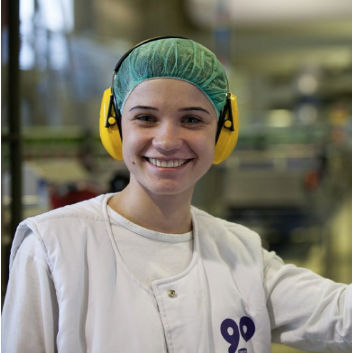Safe products and responsible communication are critical to building and strengthening the trust in our brands of our consumers and stakeholders.

Increasing the health and well-being of as many people as possible with selected foods and beverages - that is our mission. This includes not only healthier products and a balanced diet. We also want to help build a healthier future with our own business practices. After all, we can only fulfill our mission with the continued trust of our consumers. To gain and maintain this trust, we communicate responsibly - especially toward children* - and make food safety our top priority everywhere and at all times. We pursue these goals globally and regionally in the Germany, Austria and Switzerland region.
Food safety



Our primary goal: to develop, manufacture and deliver safe products. Our Food Safety Policy also helps us ensure that our products comply at all times with local laws and regulations, as well as with our strict food safety benchmarks. We also actively participate in the GFSI Global Food Safety organization to leverage the latest research on food safety techniques and processes.
Checking our compliance


We constantly check our compliance and - if necessary - initiate corrections. Danone's compliance with the ICC Code is reviewed annually and globally by KPMG as part of the audit of our nutrition reports. We publish the result in our reports (Integrated Report, Nutrition & Health Achievements brochure) on our website.

We review our communication to children particularly thoroughly: internally through the Danone Way (audited by PwC) as well as through the numerous local and regional agreements we have in place.
In most of the countries involved, compliance with this commitment is certified by a third-party. Since 2009, for example, Accenture has been commissioned by the IFBA to independently verify companies' compliance with the Marketing Principles every year. We publish the compliance score for TV and Internet media in our reports (Integrated Report, Nutrition & Health Achievements brochure) on our website.
In the area of marketing of breast-milk substitutes, we conduct self-initiated external audits. Thus, every year we work with qualified external experts to conduct these assessments. In addition, we publish their findings and address the indicated problem areas. In addition, FTSE4Good regularly commissions thorough verification assessments of our practices together with independent third parties to ensure that we are also complying with the strict criteria of the index.
RESPECT program for sustainable sourcing


Our RESPECT program, launched in 2005, extends our commitment to economic success and social progress along our supply chain - with the exception of milk producers, who are covered by the FaRMS sustainable agriculture program.
Through the RESPECT program, all direct suppliers in certain categories undergo a rigorous process of evaluating their social, environmental and ethical performance. In this way, we increase supply chain reliability, conserve our planet's natural resources and protect the people who work for and with us.
At Danone, we believe that what we do and how we do it are equally important—which is why we have put responsible, sustainable sourcing practices in place throughout our supply chain and made them an integral part of our strategy. We are also a member of the AIM-Progress forum, which contributes to continuous improvement in sustainable purchasing across our industry, and we are an active member of the Consumer Goods Forum (CGF).
In line with our sustainability principles, we have aligned the RESPECT program with social, environmental and ethical fundamentals, which are set out in our General Procurement Terms and Conditions and incorporated into all contracts.
Our goal is to consistently implement these guidelines and improve the sustainability and ethical performance of suppliers. To do this, we make conscious decisions: in some cases, we see no other option than to end the relationship with suppliers who do not want to play by these rules.
Our approach


We believe that we play a crucial role as a food company: Through our broad product portfolio, we have a positive impact on public health and nutrition issues. We also believe that our communications and services should help educate consumers about the importance of a healthy diet and lifestyle. We aim to educate healthcare professionals on the importance of proper nutrition at all ages.
We are committed - in accordance with the International Chamber of Commerce Code of Responsible Marketing Communications for Food and Beverages and national and regional standards - to responsible advertising. Our approach includes all paid and unpaid communications we develop, particularly materials used to promote our brands or products to consumers.
We are committed to ensuring that our marketing communications are legal, decent, honest and truthful at all times. Our claims are also based on solid scientific evidence. What does that mean?
- We provide the nutritional information that consumers can use to make informed dietary decisions.
- We place particular emphasis on practical and user-friendly information to help consumers eat healthily for themselves and their families.
- We ensure that our information on product benefits is reliable and understandable.
Working with our industry associations, such as the World Federation of Advertisers and the International Chamber of Commerce (ICC), we support the development of general principles in this area and their integration into advertising and marketing self-regulatory codes and systems around the world.
Our global principles


Danone commits to encouraging first and foremost healthy products in the allocation of its marketing spend. 88% of Danone’s sales volumes being in healthy categories, the vast majority of our marketing spend is on healthy products.
Furthermore, thanks to our Nutrition Commitments, we expect our marketing spend on healthy products and healthier alternatives to increase globally in the coming years. For reference, we publish each year (in our Nutrition & Health Achievements Leaflet and our integrated report) the percentage of marketing spend that promotes healthy categories and the healthiest products in a portfolio.
Keenly aware of the prevalence of chronic diet- and lifestyle-related diseases, it is our policy and principle to avoid any type of message that could encourage overconsumption of any of our products or the pursuit of unhealthy lifestyles. We commit to presenting products in a context of a balanced diet.
We also do not use 'size zero' models or actors in our advertising to make sure it does not promote 'unhealthy' slimness. Danone also commits to promoting diversity in its advertising.
Communication with children


Marketing and advertising influence the purchasing behavior and short-term eating habits of children under twelve - research has shown this.
As a founding member of the EU Pledge (2007), we have therefore limited our marketing and advertising toward children between the ages of three and twelve to the following nutrition criteria.
We now only promote products that comply with the following guidelines:
- Guidelines from stricter common industry criteria, such as the common EU nutrition criteria.
- Or, from 2021, our stricter Danone nutrition criteria.
You can find our marketing policy here. Our marketing principles for children include:
- no misleading messages
- no undermining of parental influence
- no indication of time/sensitivity of urgency or price minimization pressure
- no exploitation of a child's imagination or inexperience
- no promotion of unhealthy eating habits
- no blurring of the boundary between marketing and branding
Concretely, we apply the following rules:
- no use of celebrities or licensed characters, except in the case of products that meet the above nutrition criteria.
- no use of promotional games, toys, coupons, contests, except in the case of products that meet the above nutrition criteria.
- no sampling or communication of products in primary or secondary schools, kindergartens, day care centers and activity centers - unless specifically requested by or agreed with the school administration for educational purposes, and only in the case of products that meet the above nutrition criteria.
To date, our marketing to children has included commercial communications via TV and radio, print, third-party Internet and the company's own websites.
*We advertise to children in line with our ambitious Danone marketing approach or in accordance with local regulations in countries where individual regulations are stricter.
Marketing of breast milk substitutes



We support the WHO's global public health recommendation calling for exclusive breastfeeding for the first six months of life. As well as a further breastfeeding period of up to two years (and beyond) and the safe introduction of appropriate complementary foods.
We have published our own position paper on health and nutrition in the first 1,000 days. This is based on two beliefs:
1. breastfeeding must be protected and promoted.
2. the best nutrition for mothers, infants and young children must be ensured.
We fully support the WHO recommendation that infants should be exclusively breastfed for the first six months of their lives and continue to be partially breastfed beyond that time.
That's why we take care to market our products responsibly and adhere to legal requirements. This means that we do not advertise first infant formula and adhere to strict legal requirements when advertising follow-on formula. Our goal is to enable parents to make an informed decision when choosing the right product on the basis of sound information. In doing so, we in no way present our products as equivalent to breast milk.
In 2016, we were included in the FTSE4Good index. In addition to meeting the inclusion criteria for environmental, social and governance practices, FTSE4Good companies marketing breastmilk substitutes must meet certain marketing indicators.
Responsible use of nutrition & health claims



In 2002, we introduced an internal corporate policy at Danone that applies to all business units. It ensures the consistency, credibility and scientific accuracy of the health and nutrition messages that go into each of our communications.
All commercial communications that contain health or nutrition claims and are aimed at the public, customers or health professionals must be validated in accordance with this policy - including joint advertising campaigns and sales promotion campaigns where one of our brands is named or implied.
To ensure consistency and robustness of communications with consumers and healthcare professionals, we establish communication guidelines and implement them in accordance with the local legal framework. Communication is in line with the relevant legal framework, local practice, and codes of best practice and ethics. Nutrition or health claims are substantiated by scientific evidence.
Providing nutritional information to consumers



Since 2007, we have been voluntarily committed to providing consumers with comprehensive nutritional information, such as a detailed nutrition table on the back of each product, summarized nutrition information on the front of each package, and a contact for consumers to obtain product and nutrition information (website, call center...).
For all of our products for the general public and in all regions where they do not conflict with local labeling regulations, we are committed to providing the following on the packaging:
- The nutrient intake that most people should consume daily for a healthy diet.
- The serving size and, with respect to multiple-serving packages, the number of servings contained in the package.
- Detailed nutritional information on the back of the package, including energy, fat (of which saturated fat, monounsaturated fat, polyunsaturated fat), carbohydrates (of which sugars, polyols, starches), fiber, protein, and salt; in 3 different ways (per 100g/100 ml; per serving; per % of reference intakes per serving).

